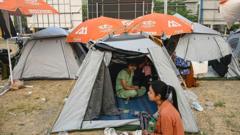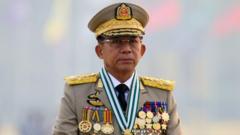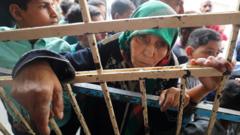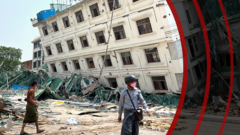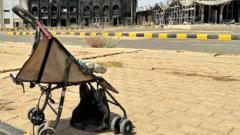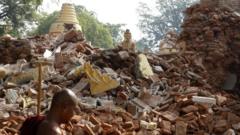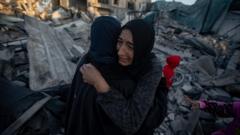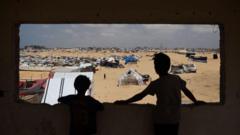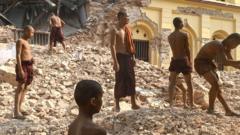As Myanmar struggles with a devastating earthquake and ongoing civil conflict, a Chinese convoy delivering aid was caught in violent crossfire, raising significant concerns over safety protocols and international aid efficacy.
Myanmar Military Conflicts Linger as Quake Relief Efforts Endanger Chinese Convoy
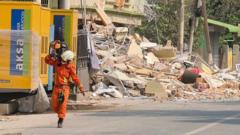
Myanmar Military Conflicts Linger as Quake Relief Efforts Endanger Chinese Convoy
The military regime in Myanmar escalates tensions by firing on an aid convoy, revealing the ongoing complexities of humanitarian efforts amid civil unrest.
Myanmar's military reportedly opened fire on a Chinese Red Cross convoy delivering earthquake relief supplies to the hard-hit city of Mandalay on Tuesday night. The Ta'ang National Liberation Army (TNLA), a local armed rebel group, stated that the military began firing from machine guns at the convoy, which consisted of nine vehicles traveling through eastern Shan state. Fortunately, there were no reported injuries from this alarming incident.
In response, Myanmar’s junta claimed it was investigating the situation, denying that troops fired directly at the vehicles. According to military officials, the convoy failed to comply with signals to stop, prompting soldiers to shoot into the air as a warning. A spokesperson for the military explained, “When we saw the convoy… we stopped it. But they continued. We opened fire from about 200 meters away” before the vehicles retreated.
China’s foreign ministry quickly addressed the situation, affirming the safety of their rescue team and emphasizing the need for all factions in Myanmar to prioritize earthquake relief efforts. This incident has further complicated the already precarious humanitarian conditions in Myanmar, which have been exacerbated by a civil war between the ruling junta, which took power in a coup in 2021, and various ethnic militias.
The humanitarian crisis in Myanmar has increasingly worsened since the catastrophic magnitude 7.7 earthquake last Friday, which the government estimates has caused over 2,700 fatalities, although many believe the real toll is even higher. Several international agencies and foreign governments have mobilized personnel and supplies to assist those affected, but coordination remains tumultuous due to the ongoing civil strife.
After the reported violations of the convoy’s movement, the TNLA asserted that they had notified the military council of their mission to deliver aid to Mandalay. Meanwhile, the junta has faced backlash for launching air strikes in Naungcho township hours after the earthquake, which resulted in casualties.
Despite the TNLA announcing a temporary ceasefire to support relief operations, the military regime showed reluctance to reciprocate. Military chief Min Aung Hlaing insists that they must continue to engage in “necessary defense operations” against ethnic groups preparing for attacks. The United Nations has condemned recent airstrikes as “completely outrageous and unacceptable,” highlighting the dire situation faced by the civilian populace still reeling from the earthquake and ongoing violence.
In response, Myanmar’s junta claimed it was investigating the situation, denying that troops fired directly at the vehicles. According to military officials, the convoy failed to comply with signals to stop, prompting soldiers to shoot into the air as a warning. A spokesperson for the military explained, “When we saw the convoy… we stopped it. But they continued. We opened fire from about 200 meters away” before the vehicles retreated.
China’s foreign ministry quickly addressed the situation, affirming the safety of their rescue team and emphasizing the need for all factions in Myanmar to prioritize earthquake relief efforts. This incident has further complicated the already precarious humanitarian conditions in Myanmar, which have been exacerbated by a civil war between the ruling junta, which took power in a coup in 2021, and various ethnic militias.
The humanitarian crisis in Myanmar has increasingly worsened since the catastrophic magnitude 7.7 earthquake last Friday, which the government estimates has caused over 2,700 fatalities, although many believe the real toll is even higher. Several international agencies and foreign governments have mobilized personnel and supplies to assist those affected, but coordination remains tumultuous due to the ongoing civil strife.
After the reported violations of the convoy’s movement, the TNLA asserted that they had notified the military council of their mission to deliver aid to Mandalay. Meanwhile, the junta has faced backlash for launching air strikes in Naungcho township hours after the earthquake, which resulted in casualties.
Despite the TNLA announcing a temporary ceasefire to support relief operations, the military regime showed reluctance to reciprocate. Military chief Min Aung Hlaing insists that they must continue to engage in “necessary defense operations” against ethnic groups preparing for attacks. The United Nations has condemned recent airstrikes as “completely outrageous and unacceptable,” highlighting the dire situation faced by the civilian populace still reeling from the earthquake and ongoing violence.


